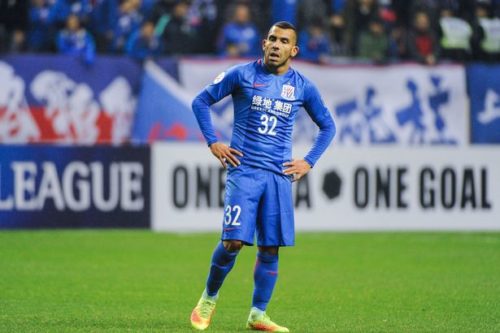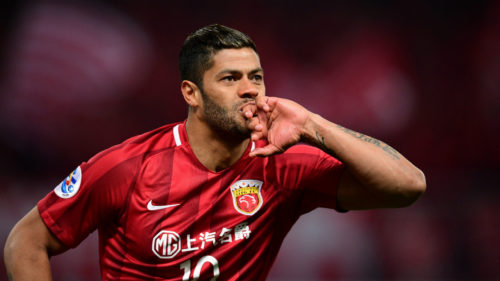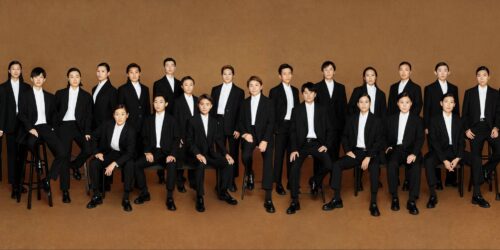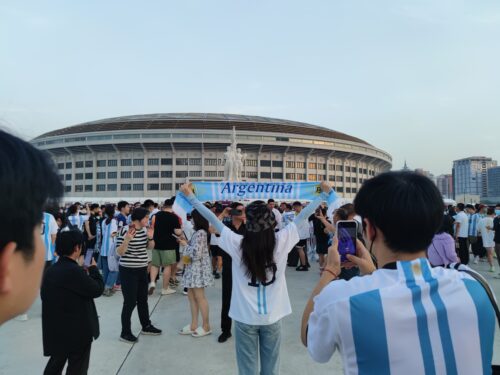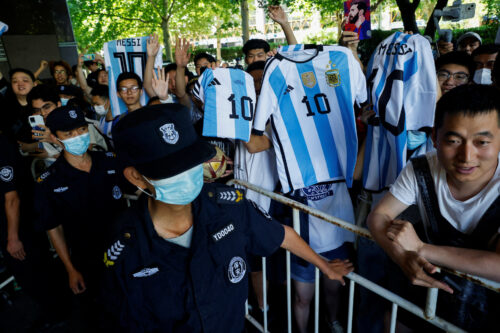Oscar’s China departure is symbolic end to Chinese Super League’s star signings
Oscar, the former Chelsea midfielder, has returned to Brazil from Shanghai Port, where he played for more than five years. He isn’t the only foreign soccer star who’s left China in recent months.
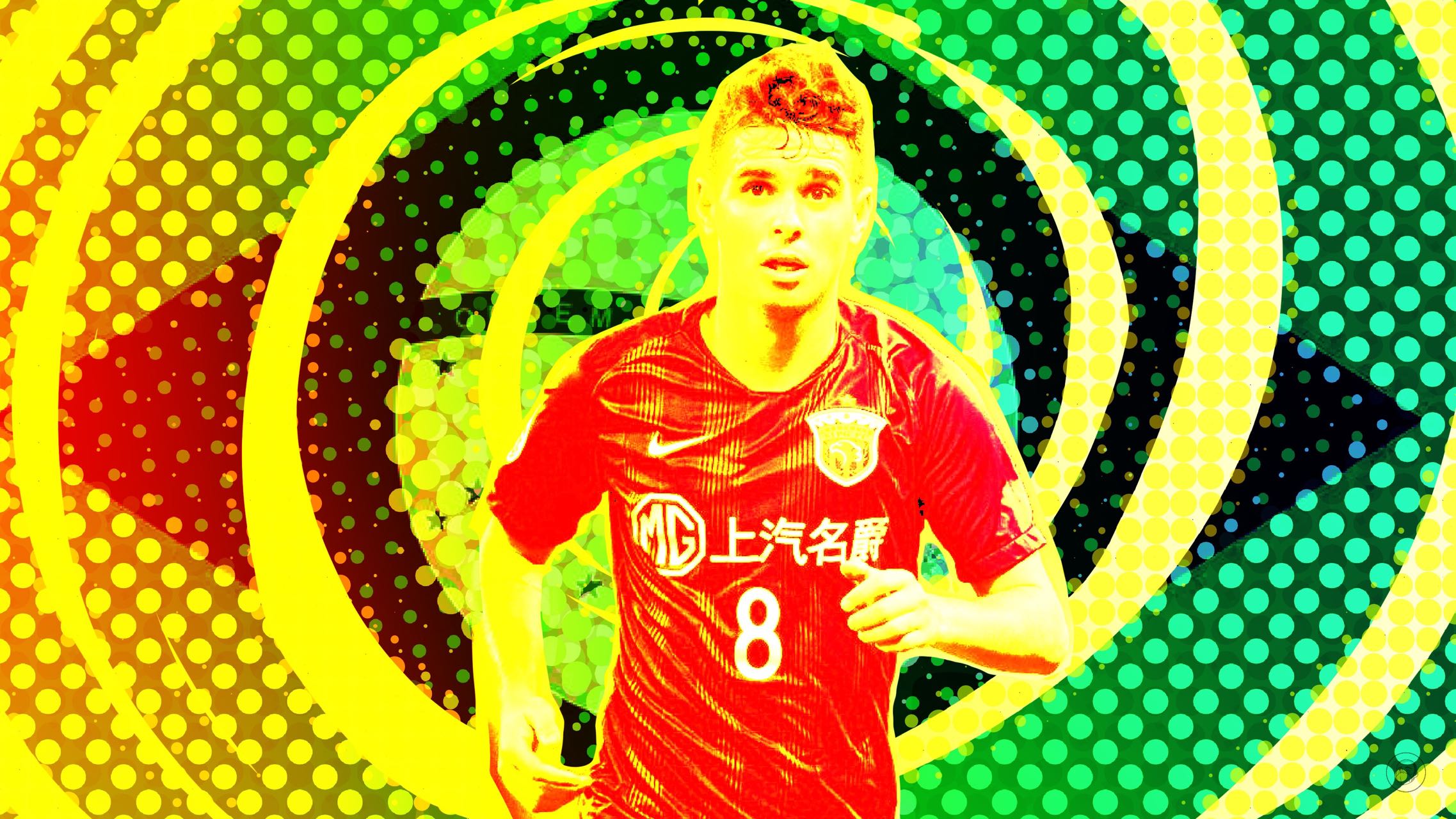
Shanghai Port soccer star Oscar has finalized a return to his native Brazil, with the midfielder signing for Rio de Janeiro-based Flamengo after five and a half years in China.
His arrival in the Chinese Super League coincided with an influx of big names, bigger investment, and overseas interest, and his departure — albeit initially on loan until the end of the year — symbolizes the end of that era of Chinese soccer.
Oscar joined Shanghai SIPG, as they were then named, in the January 2017 transfer window, arriving as a 25-year-old with 48 caps for Brazil.
The Chelsea midfielder swapped the English Premier League for the Chinese Super League in a deal worth $74 million, the seventh highest transfer fee of all time at the time and double the fee that the London side had paid Brazilian club Internacional four and a half years previously. Oscar had won the Premier League, League Cup, and Europa League with the Blues and was a fan favorite. While he had fallen out of favor with Chelsea coach Antonio Conte, playing only nine of their 19 league games before he officially signed for Shanghai SIPG, Oscar’s departure for China came as a huge shock to fans and the media.
At 25, his prime was still viewed as several years ahead of him — footballers traditionally seen as peaking at 28 — making it was almost unthinkable that he would give up further success in England or a move to another elite European club for a league where star players had previously sought paydays only toward the end of their careers. If the CSL was a retirement league, then Oscar had opted for early retirement at the peak of his powers.
Oscar now leaves Shanghai having spent a longer time there than at any club during his career. He won the CSL title in 2018 and established himself — like at Chelsea — as a fan favorite and one of the best players in the league, topping the assists standings in each of the last four seasons.
He leaves as the last of the big-name signings that followed the spending spree kickstarted by Xi Jinping’s very public support for soccer, which by August 2017 saw six of the 10 highest paid players in the world playing in China.
Even in 2019, Oscar — who was earning$26.5 million per year — was ninth among football’s biggest earners, according to Forbes, with the rest of the top 10 playing in Europe’s “big five” leagues.
He made it clear that money was his motivation. “Every football player, or every person who works, wants to earn money to help their families,” Oscar told Copa 90 in 2017.
“I came from a social background in Brazil that is very poor,” he said. “We didn’t have anything. This is the fruit of my work, and when I earn this, it is because I conquered it.
“The same way I came here, I will be able to return to Europe.”
Just as he has flirted with Europe — and even with the possibility of playing for China’s national team if the eligibility rules were changed — Oscar has suggested that he might yet return to Shanghai, where he is contracted until 2024.
“Since early 2022, I have had some personal and family issues which challenged my daily life. I have recently returned back to Brazil to accompany my family during this time,” he wrote on Weibo last Wednesday after pictures of him in a Flamengo shirt emerged on social media ahead of the reported move.
“During this period in Brazil, I will do everything to keep my competitive mental and physical conditions, by training at home or with local professional football team. Without any doubts, I am still and always will be part of Shanghai Port FC. My heart is with you and support the team in every aspects I can.
“Thanks again to all our fans and Shanghai Port FC’s for understanding and supporting us. See you very soon.”
This still seems like the end of an era — Oscar is the wrong side of 30, and star footballers are no longer moving to the CSL in their prime.
What became of the other big names that Oscar outlasted? Let’s have a look.
Alex Teixeira, Jiangsu Suning
The uncapped Brazilian forward cost $56.9 million from Ukrainian side Shakhtar Donetsk. Teixeira was linked with Jurgen Klopp’s Liverpool, but reports suggested that his club turned down a $50 million bid from the Reds.
His February 2016 transfer broke a 10-day-old record fee for Chinese clubs, besting Colombian Jackson Ramirez’s arrival at Guangzhou Evergrande from Atletico Madrid by $10 million — which had itself just beaten the days-old record of Teixeira’s new Jiangsu teammate Ramires in a transfer window where CSL sides outspent the clubs of the English Premier League.
Teixeira’s time in China was more successful than Ramirez’s, who sat out two seasons with injuries, while the Brazilian won the CSL title with Jiangsu in November 2020.
However, three months after the title, the Nanjing-based side folded completely amid owner Suning’s financial struggles, leaving Teixeira without a club. He signed with Turkey’s Besiktas in August 2021.
Carlos Tevez, Shanghai Shenhua
“Carlitos” is arguably the poster boy of CSL excess. He described his time at Shanghai Shenhua as a seven-month “vacation,” one where he earned a reported $820,000 per week, making the 33-year-old the highest-paid player in the world. He denied the reports — but there was no denying his disappointing time in China. Tevez left having scored just four goals and being dropped for the Chinese FA Cup final, where Shenhua beat city rival SIPG over two legs.
Known as “Very Homesick Boy” on Chinese social media, Tevez struggled with injury and was declared overweight by his coach, with the low point coming when he was pictured at Shanghai Disneyland at the same time his teammates were playing an away game in Changchun. Shenhua’s long-suffering fans, who have seen their fair share of disappointing foreign signings, were very critical on social media. Tevez did not help his cause by criticizing the standard of Chinese players in an interview with French media: “They’re not good. Even in 50 years, they still won’t be able to compete.”
Not everyone was disappointed with Tevez, though, such as Argentine soccer legend Diego Maradona. “He went to China. He filled up Santa Claus’ sack with dollars and came back to Boca. Perfect,” Maradona told the country’s Ole sports paper.
Hulk, Shanghai Port
The burly Brazilian was signed from Russian side Zenit St Petersburg in June 2016 for a then-Asian record fee of $61 million. It was also the 19th most expensive transfer in history at the time and a record paid by a non-European club.
That fee would be surpassed by his compatriot and new teammate Oscar six months later. Hulk claimed he sold Oscar on the idea of China, and the pair were instrumental to the club’s championship triumph in 2018. While Hulk impressed on the pitch, it was off it where he made the headlines: leaving his wife for her niece. He is currently back in Brazil with Atlético Mineiro.
Axel Witsel, Tianjin Quanjian
The Belgian followed Hulk from Zenit to China, signing for Tianjin Quanjian. The club was backed by a TCM giant that snapped up Witsel along with former Golden Boy Alex Pato and France striker Anthony Modeste. The team went from the Chinese second tier to the AFC Champions League.
The club was rocked after Quanjian Group, a multi-level marketing scheme, fell afoul of authorities. After being taken over by the local sports authority, their stars left, with Modeste claiming he was owed wages and suing the club before returning to Cologne. Pato returned to Brazil before heading to the MLS, while Witsel moved to German Bundesliga side Borussia Dortmund before signing for Atletico Madrid this summer, where he will play alongside his Belgium teammate Yannick Carrasco, formerly of the CSL side Dalian Pro.

